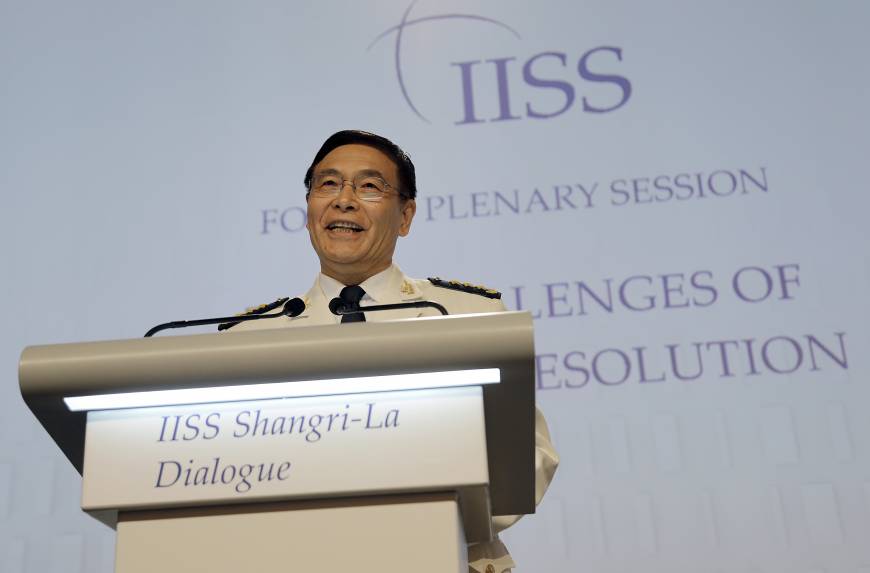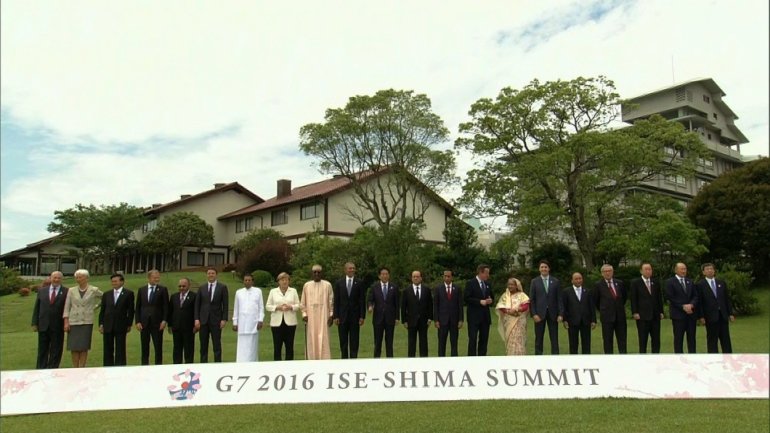
by Robert Whitcomb | Jun 7, 2016 | AI World Society Summit
(June 13th, 2016) In the context of China’s repeated incursions into Japanese territorial waters in the East China Sea and attempts to dominate the South China Sea by military force, Japan, India and the United States will hold major trilateral naval exercises off the east coast of Okinawa Prefecture through June 17, the Japan Maritime Self Defense Forces said June 7.

The large-scale exercises are part of an annual event that since last year has included Japan as a permanent member.
The Japan Times reported that drills, “which will focus on anti-submarine warfare and air-defense training, are likely to bolster ties among the three allies.’’
China has been rapidly bolstering its submarine and other naval forces in the East China and South China Seas for the past several years, worrying other nations in the Asia/Pacific region.
For more information hit this link.

by Robert Whitcomb | Jun 7, 2016 | AI World Society Summit
(June 13th, 2016) An increasingly militaristic and aggressive Russia is building new military sites along what the Kremlin sees as its western frontline in a growing confrontation with NATO.

At the same time the NATO alliance is staging major military exercises and increasing deployments on its eastern flank in response to Russian aggression against Ukraine and threatening actions by the Russian air force over and near the Baltic Sea.
Russia and NATO member states share borders around the Baltic Sea; further south Ukraine and Belarus separate the two blocs.
Russia has pulled out of the treaty on Conventional Forces in Europe, a post-Cold War pact that limits the deployment of troops in Europe. This makes it feel freer to move extra troops and military equipment to its western border.
For more information, hit this link.

by Robert Whitcomb | Jun 7, 2016 | AI World Society Summit
(June 13th, 2016) The Guardian reports that team of security researchers are calling on Mitsubishi to recall at least 100,000 Outlander hybrid cars after exposing a security breach that let “the hackers to remotely turn off the car’s alarm system, control the lights and drain the battery.’’

The publication reported that “Ken Munro, the security expert who led the investigation, was tipped off about the vulnerability when his friend’s Outlander showed up as a Wi-Fi access point on his phone. Curious, he bought one of the cars himself and set about hacking it.’’
The Guardian elaborated: “Modern cars with their own smartphone apps, which offer a way of monitoring features such as battery level and alarm status, usually connect through a Web-based service that uses GSM, a mobile data communication channel. But the Outlander uses wifi to connect the car directly with a smartphone, which is less secure and allowed Monroe to disable the alarm and then open the car.’’
For more details, hit this link.

by Robert Whitcomb | Jun 7, 2016 | Initiative
(June 13th, 2016) French security forces have been staging scary simulated terror scenes to train for the European football championships, which start June 10.

At least 30 “doomsday’’ scenarios staged by police and emergency services have been held across France in the run-up to the championships. It is the heaviest sports security operation in history. For details, read this link.

by Robert Whitcomb | Jun 6, 2016 | AI World Society Summit
(June 13th, 2016) In what has caused some chuckling, Facebook Chief Executive Mark Zuckerberg’s Twitter and Pinterest accounts have been resecured, after media reports that the social-media mogul’s sites had been hacked.

VentureBeat said that Mr. Zuckerberg’s Twitter and Pinterest accounts were compromised over the weekend.
Perhaps most interesting is that the nature of the bogus tweet sent from Mr. Zuckerberg’s Twitter account on Sunday suggests that the alleged hackers may have gained access to the account by using the same password associated with his LinkedIn profile. Sloppy computer hygiene by Mr. Zuckerberg? For more information, hit this link.

by Robert Whitcomb | Jun 6, 2016 | Initiative
(June 13th, 2016) Scarborough Shoal, in the South China Sea, may be becoming a line in the sand against Chinese militaristic expansionism in that sea, most of which China claims. China seized and occupied the shoal in 2012.

It is unclear what the United States and nations friendly to it in the region would do if China continues to seize and militarize reefs and islands in the sea.
China has warned that it might respond to an unfavorable international arbitration ruling against its claim to the “island’’ in favor of the Philippines by putting structures on the shoal to give it a military outpost very close to the Philippines’s door. Chinese Admiral Sun Jianguo says China will not accept the tribunal’s ruling, expected sometime this summer.
Speaking at a Singapore forum, U.S. Defense Secretary Ash Carter said that the U.S., as an ally of the Philippines, would take action, without elaborating. Hit this link for more information.

by Robert Whitcomb | Jun 6, 2016 | Initiative
(June 13th, 2016) The Russian government has not been raising social benefits despite higher prices and some other good macroeconomic news. According to at least observer, that’s because the government has been spending more and more on its military and security forces as the Putin government continues to act aggressively abroad and to stifle opposition forces at home.

Hit this link for more information.

by Robert Whitcomb | Jun 6, 2016 | Initiative
(June 13th, 2016) NATO’s largest war game in Europe since the end of the old Cold War is underway in Poland, as alliance members seek to show strength in response to concerns about Russia’s aggression.

NATO allies have welcomed the 10-day military exercise, involving 31,000 troops and thousands of vehicles from 24 countries, although some defense experts warn that any mishap/miscalculation could prompt an offensive reaction from Moscow.
Hit this link for more information.

by Robert Whitcomb | Jun 5, 2016 | AI World Society Summit
(June 6th, 2016) Leaders at the G7 Summit approved the first international stand-alone agreement on cybersecurity, including data protection and Internet governance. A number of organizations, including the Boston Global Forum (BGF), submitted recommendations to the leaders for their consideration. The BGF’s recommendations included what it calls the Ise-Shima Norms for cyberbehavior, which builds on the BGF’s Ethics Code of Conduct for Cyber Peace and Security (ECCC). (Ise-Shima is the Japanese region where this year’s summit was held on May 26-27.)

World leaders attend the G7 2016 Ise-Shima Summit in Japan.
The BGF’s recommendations were part of its BGF-G7 Summit Initiative.
“We endeavor to develop policy frameworks that further promote effective privacy and data protection across jurisdictions to meet high standards of privacy and data protection,” according to a statement of principles in the G7 leaders’ agreement.
“We also welcome proactive approaches such as ‘Privacy by Design,’ which take privacy and protecting personal data into account throughout the engineering process. We recognize that protecting privacy and enhancing cybersecurity help ensure business and consumer trust and promote innovation crucial to our economic growth.”
“It sounds innocuous, but it’s not. It’s actually very significant,” John Savage, An Wang Professor of Computer Science at Brown University, told Roll Call’s Paul Merrion. Professor Savage is a BGF member who helped draft the Ise-Shima Norms.
“It’s progress, it’s recognition that nations need to help one another.”
The agreement also states that “no country should conduct or knowingly support ICT (information and communication technology)-enabled theft of intellectual property, including trade secrets or other confidential business information, with the intent of providing competitive advantages to its companies or commercial sectors.’’
It continued: “We commit to facilitate the free flow of information to ensure openness, transparency and freedom of the Internet, and a fair and equal access to the cyberspace for all actors {in the} digital economy while respecting privacy and data protection, as well as cybersecurity.’’
Further, the G7 affirmed: “We continue to support ICT policies that preserve the global nature of the Internet, promote the flow of information across borders and allow Internet users to access online information, knowledge and services of their choice. We oppose data localization requirements that are unjustifiable, taking into account legitimate public policy objectives.”
Professor Savage told Mr. Merrion: “That’s directed at the Chinese and Russians, but mostly the Chinese.” While it doesn’t directly and immediately affect these countries, “it’s a talking point,” he told Mr. Merrion









